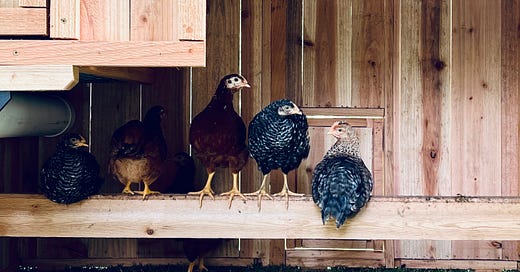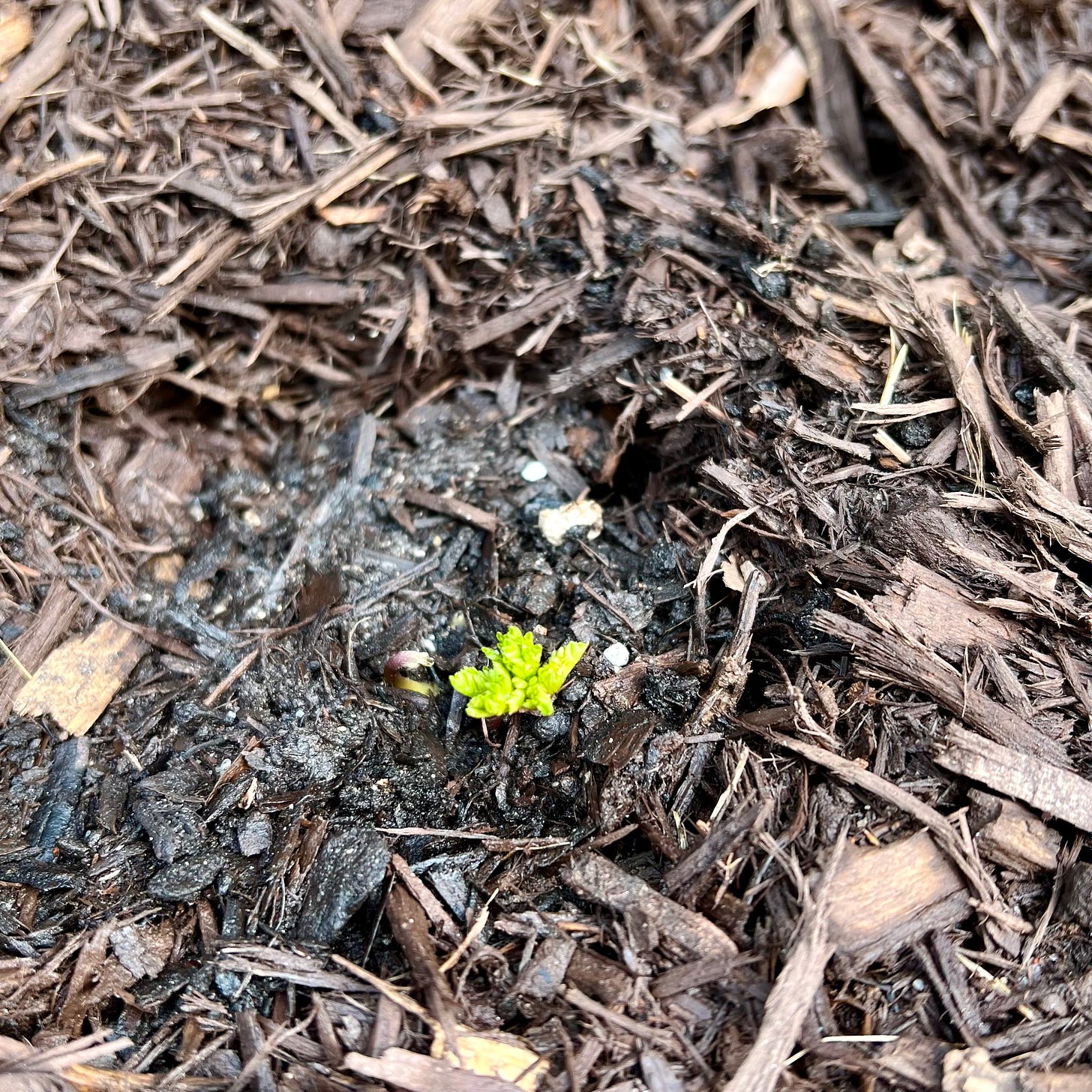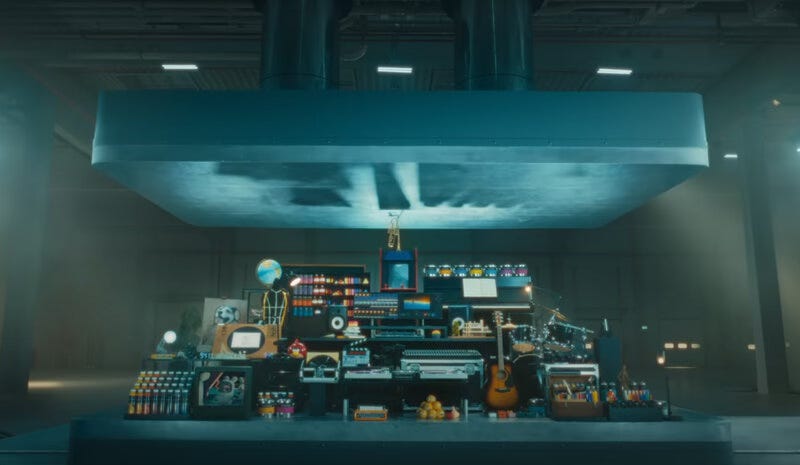I heave a torn-open bag of chicken feed onto a knee, then a shoulder. Sweat slicks my temples as I pour pellets smelling of wheat into a wide, white tube. My son stands beside me, brown as earth, his tiny arm outstretched as if to help.
Before the feed can reach the bottom of the pipe, the birds are roused from their perch, dancing on the tops of my shoes, their spiked toes pinpricking mine through the canvas of my sneakers. Their heads bob in a nearly-synchronized hunger dance. The narrow tubes of their throats can pass only one pellet at a time, and even that requires the effort of outstretched necks, more head-pumping as they point their beaks skyward and swallow.
The coop smells of grass, mud, water, cedar. It smells of little boy and feathers. The almost-summer sun vibrates our skin; mud squelches beneath our feet. The teenaged hens are still beautiful, their feathers shiny. After weeks in our dark basement, grass and the color green are both brand new to them. In a few weeks the grass and coop and feeder will all be brown, the complex smell of earth replaced by the one-note smell of shit. I shift my weight, lower the bag, my son beside me, his hand now on my back.
I never want to feed the chickens until after I have fed them.
It is a ritual, like the way I scoop soil with my fingers, then mushroom compost from the bag, making thirty holes by the fence. Anemone corms, ranunculus bulbs, zinnia seedlings. With the hose I spray buckets with bleach, water plants by the front door. I seize fistfuls of overgrown oregano, tottering backward with each snap snap snap of the roots until the wad is loose. I gather the sprigs with twine and hang the bundle from our stove hood until it dries. I build a giant trellis with screws and wood glue and, with a mallet, assemble a fence to encircle the chicken coop. I learn how to use the staple gun to install hardware mesh, involuntarily closing my eyes and holding my breath every time I squeeze the trigger. Every few days, I have to re-wash the orange clay from the tread of my sneakers.
Gardening is dirty. Chickens are… dirtier. But this is how I remind myself I have a body—that the world around me is real, not made of pixels. This summer, like every summer, I crave what’s analog.
As Mary Oliver says, “I have my way of praying, as you no doubt have yours.”
A few weeks ago, Apple released the new iPad Pro with an ad they called “Crush!” In an industrial, dimly-lit warehouse, we see iconic symbols of creativity stacked high: instruments, paints, books. Then a massive hydraulic press is lowered, crushing all the items we associate with art and making. It crushes the record player, the paints, the trumpet. The piano, the sculpture, the camera, the guitar, the books. Wood splits, paint splatters. Finally, it crushes a foam emoji face, eyes bulging before they fly from their sockets.
When the press lifts, a shiny new iPad sits where all the other objects once were. In the background, Cher croons, “Give me a reason to build my world around you.” She’s singing, presumably, to the iPad.
It's the first time Apple has ever had to apologize for an ad. Internet people lost their minds over it. Hugh Grant tweeted, aptly: “The destruction of the human experience. Courtesy of Silicon Valley.” The backlash was so swift and fierce, Apple CEO Tim Cook publicly announced they “missed the mark.”
I know the chicken feeding bit can read as quaint. Old-fashioned. Twee. #Tradwifey.
Trust me, people roll their eyes at me and my birds all the time. I think it’s because there are all these unspoken emotions around the kind of labor we do, how we spend our time, what we consider worthwhile (especially as women). And on social media we see all these [doctored, curated] images of women performing creativity: baking sourdough bread on a countertop magically devoid of any floury mess, cracking open fresh eggs magically devoid of any poop smears, children gallivanting in perfectly laundered, handmade clothing. It’s all so… charged.
I don’t want to apologize for what keeps me sane and grounded. I don’t have an influencer bone in my cornfed body, but I have found some things that bring me peace. Many of those things are laden with domestic mythology: slow cooking, chicken keeping, gardening. Or they are considered artistic luxuries: painting, writing. We can’t see them done without having a reaction, whether positive or negative. We are programmed to think, “Isn’t there a machine that can do that?” or “Only oppressed women plant flowers” or “What is she trying to prove?”
This time last year, I put my iPhone in a drawer for 106 days because I felt like I was constantly vibrating, not in a good way. This summer I feel far less frazzled. The smartphone in my pocket doesn’t feel threatening. I think it’s largely because I’ve traded time in digital spaces for time in outdoor spaces. I spend the time I used to spend staring at Instagram staring at trees. Really, I’ve traded convenience for labor, shine for mess. In other words, I seemed to be trading down, not up.
Apple wants us to believe that swapping the trumpet for the iPad (that makes trumpet-like sounds) is trading up.
Apple wants us to believe that the direction of efficiency is unequivocally the right direction.
Apple wants us to feel weird or embarrassed about questioning this, about standing in a chicken coop surrounded by sights and smells that supposedly belonged to an earlier, pre-industrial age.
Apple wants us to direct our derision at one another—at everyone else’s choices—so we forget to direct it at them. It’s no accident that we forget to ask if our frustration is less with one another and more with these machines.
What if, against the ethos of every advertisement and the capitalism that drives our nation, we opted to trade down?
Is there something to be gained from the slog and grind?
Are we sure leaving behind the mess of yesteryear was the right call? Or did we maybe swap sweat and dirt and waiting and boredom and solitude for… squeaky-clean misery?
Yesterday I took the kids to an art store, not the peppy chain kind but the poorly lit mom-and-pop kind. While were waiting on the salesperson to mix paint for us, the kids touched every art supply on every shelf. “What’s this? What’s this?” The tubes of acrylics and bottles of ink looked so charming and anachronistic without all the coordinated signage and packaging we’re used to at Michael’s. I promised them I’d get out my charcoals when we got home, sticks I saved from a college art class 19 years ago.
My daughter and I sat in the grass and sketched flowers and weeds. The charcoal blackened our hands, our forearms, even our noses and mouths when we inevitably touched them. In an hour, we had covered six expensive pieces of drawing paper—and ourselves.
An iPad would have been much tidier.
But there was lots of talk about mistake-making that I think the iPad wouldn’t have allowed for with its instant digital erasures. My daughter was ready to toss her paper after her first stroke, and I wouldn’t let her. The piece of paper was a tangible thing that cost money. We talked about how charcoal, as a medium, smudges toward forgiveness, if you’ll only let it. Eventually, her first errant stroke transformed into another thing because she was forced to keep it. There’s something about these outdated tools that forces us to see what it is we’re doing. To notice.
Of course I don’t hate technology. Of course real creativity can happen on an iPad. Of course I’m typing on a laptop that might as well be a permanent extension of my fingertips.
But I think we ought to be wary of abandoning the stuff of creativity: the movement and mess of it. The interruptions, the failures. And I’m not just talking about artists. I think there’s something fundamentally human about dirt and stink and sweat, calloused fingers and dirty nail beds.
In the piece below, L. M. Sacasas explains tech philosopher Albert Borgmann’s distinction between the “device” and the “focal thing.”
The device paradigm “describes the tendency to hide the complex machinery of a technology below a slick, commodious surface that makes the output of a device available to the user with minimal effort.”
So, everything Apple has ever made has that “hidden” quality, almost like an inherent dishonesty. The intricate, difficult-to-make parts are left intentionally unseen, so we’re always working with an illusion.
By contrast, “Focal things demand something of us. They require a measure of care, practice, and engagement that devices do not. Our use of them induces our focus, which they invite by design.” Focal things are musical instruments, charcoal sticks, bags of chicken feed, crumbly brown ranunculus bulbs, tubes of pigment, rakes and hoses.
I’ve noticed that when I read before bed, I feel renewed. When I watch television before bed, I fall asleep still wired and anxious from the day.
Both activities seem completely passive, but maybe that’s the distinction: the book is a focal thing, something that demands my attention. The screen is too slick, paradoxically, to offer renewal. It’s too easy to look away, to stop noticing. In a book, all the labor of the author is right there, on the page. If you want, you can see how the sentences were made.
In other words, real creativity—the kind of “making” that replenishes us and feeds our souls—feels more like grimy fingernails reeking of chicken shit, less like taps and swipes.
Here are the full lyrics to the Cher song in the Apple ad. It matters, I think, that the Apple team signed off on this. As Alan Jacobs said in response, the ad "has given me a peek into the company’s soul, and what I see is a company that despises and mocks many of the things I most love.”
So here’s the song, lyrics directed to the iPad (emphasis mine):
Sometimes when I'm down and all alone
Just like a child without a home
The love you give me keeps me hangin' on
Oh honey, all I ever need is you
You're my first love, you're my last
You're my future, you're my past
And loving you is all I ask, honey
All I ever need is you
Winters come and they go, and we watch the melting snow
Sure as summer follows spring, all the things you do
Give me a reason to build my world around you
Some men follow rainbows, I am told
Some men search for silver some for gold
I have found my treasure in your soul, honey
All I ever need is you
Without love I'd never find the way
Through ups and downs of every single day
I won't sleep at night until you say, my honey
All I ever need is you
“You’re my future, you’re my past.” It’s not so far-fetched, is it?, to imagine singing this to our Apple devices. After all, they will rule tomorrow at the same time they store our yesterdays. The song fits. No one laughed out loud when it was suggested.
But I’m fairly certain you’d all have me committed (and should) if you found me singing that to my chickens. The birds don’t have much to offer me, no promises to make or keep. Their design is fairly straightforward, and they don’t offer upgrades. Certainly, I have not found my treasure in their souls.
There’s something soothing about that.









Another thought-provoking, beautifully written newsletter. Can I come back in another life as your daughter? I was recently interviewed on a podcast called Humans Outside with Amy Bushatz that's perfectly aligned with these reflections - I'm sharing this with her.
Lindsey- Thanks for sharing this. I particularly love the way you weave different things together, including chicken feeding, gardening, and a reflection on efficiency. Your writing is a great reminder live with eyes wide open. Hope you're well this week. Cheers, -Thalia